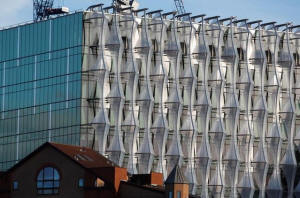|
U.S. prepares to open doors on
billion-dollar London embassy
 Send a link to a friend
Send a link to a friend
 [December 13, 2017]
By William James [December 13, 2017]
By William James
LONDON (Reuters) - The United States'
diplomatic team in London, custodians of one of the most significant
bilateral relationships of the last 100 years, will next month move into
a new home: a billion-dollar, 12-storey glass cube overlooking the River
Thames.
The long-planned move falls after the election of U.S. President Donald
Trump, which has placed a new strain on the "special relationship"
between Britain and the United States - a broad political, cultural and
military alliance forged over the last century and exercised on
battlefields around the world.
Britain's closest ally will leave behind an imposing 1960 stone and
concrete embassy in London's upmarket Grosvenor Square - an area known
as 'Little America' during World War Two, when the square also housed
the military headquarters of General Dwight D. Eisenhower.

The new site on the south bank of the river is at the heart of a huge
regeneration project in a former industrial zone known as 'Nine Elms'.
Set in what will become an urban park, it will host 800 staff and around
1,000 visitors each day.
The U.S. State Department ran a competition to design the new building
in 2008. It described the embassy as "a physical manifestation of the
long-term commitment to the special relationship between the United
States and the United Kingdom."
The glass structure "gives form to core democratic values of
transparency, openness and equality" a State Department briefing
document said. Its $1 billion construction was wholly funded by the sale
of other properties in London.
[to top of second column]
|

The new U.S. Embassy catches the evening light as it nears
completion, in Nine Elms, London, Britain October 20, 2017.
REUTERS/Peter Nicholls

The British-U.S. relationship has been tested in recent months.
Britain's Prime Minister Theresa May was the first foreign leader to
visit the White House after Trump's surprise election in November
2016. While the two leaders have committed to strengthen trade links
and spoken regularly, their governments have disagreed on several
issues, such as Trump's decision to decertify Iran's compliance with
a multilateral nuclear deal, and his move to recognize Jerusalem as
the capital of Israel.
Earlier this month, May publicly criticized Trump for reposting
British far-right anti-Islam videos from his Twitter accounts. He
responded with a rebuke, telling May to focus on Islamic extremism
in Britain.
(Reporting by William James; Editing by Hugh Lawson)
[© 2017 Thomson Reuters. All rights
reserved.]
Copyright 2017 Reuters. All rights reserved. This material may not be published,
broadcast, rewritten or redistributed.
 |